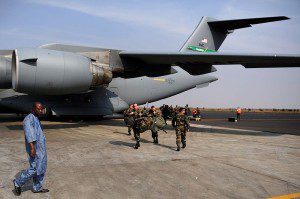If there is an Obama Doctrine in the realm of foreign affairs, it comprises robust multilateralism—being multilateral when the U.S. can, unilateral when it must. Subjected to scrutiny, however, the Obama Doctrine can only work if the U.S. has capable and willing partners. Yet under conditions of widespread fiscal austerity among western allies—and the political austerity of skeptical western citizens—meeting the challenge of securing their joint interests is formidable. While the U.S. has begun to shore up the security of its allies in Southeast Asia via its rebalance to Asia, despite potentially threatening China in the process, forging renewed partnerships with long-standing European allies is even more essential.
Many commentators in the U.S. have written off its European allies, but a nascent trend to the contrary is now detectable. Britain, France, and others have begun recalculating their own willingness to act in light of the U.S. rebalance to Asia. Contrary to conventional wisdom in Washington, a shift toward greater European military activism may be underway. Indeed, the prominent role played by British and French forces inter alia in Libya and Mali are not isolated events; instead, they may be signs of things to come. In reality, top officials in the U.S. and Europe are making progress on beginning to find ways to usefully partner in order to deal with recurrent threats and unchanged security interests particularly pertaining to the Middle East and North Africa (MENA).
Despite a serious and ongoing financial crisis cum recession in Europe that in economic terms EU leaders have barely muddled through, on the security side our European counterparts by and large have not reduced their defense spending as much as has been widely assumed. On the contrary, certain potential U.S. partners have actually maintained and/or slightly increased defense spending. More importantly, military capability is a more telling indicator than crude measures of aggregate spending. Even where cuts are underway, as the Libya and Mali operations indicate, there is a growing propensity among certain European allies to act when their interests demand it—even on occasion largely without the U.S. In this regard the debate over intervening in Syria was little more than a sizable red herring, caught up in the faulty intelligence legacy of the Bush-Blair years. The one country that remained ready to act was France.
France has mostly been in the headlines of late for the personal peccadilloes of Dominique Strauss-Kahn and more recently President Francois Hollande, but credit goes to the French public for not being as squeamish as Americans—not only about the personal affairs of their leaders, but more importantly about the increasing propensity of France to project foreign policy power and intervene in a series of recent global crises in both MENA and Africa proper.
Few noticed several years ago that France conducted the EU operation in Chad almost entirely on its own, and the same for the UN operation in the Ivory Coast (both were largely ignored in Washington). There was an unsuccessful raid of al-Shabbab conducted in Somalia in early 2013, but France intervened in the highly unstable Central African Republic at the end of 2013. In-between France demonstrated particular skill in conducting its Mali intervention, which has been heralded as a successful demonstration of an alternative way to intervene compared to the experience of U.S.-led allies in Iraq and Afghanistan.
The French operation was impressive at the outset in that it took only three months to go from a decision in Paris to achieve operational boots on the ground. French military sustainability was amply demonstrated, with its contingency force growing to 5000 deployed troops midway through the intervention (only 7 troop fatalities occurred). The French with Chadian support accomplished their military objectives with relative ease in harsh field conditions, beyond the gaze of any reporters and therefore less likely that France would suffer diplomatically from any images of its troops killing Islamic fighters (a brigade has remained in Mali after the successful election of a new president). All of this was accomplished with broad and deep support across elite and public opinion.
The French delayed their much anticipated White Paper on defense capabilities in order to take account of the recent change in their strategic thinking. What was originally intended to focus more on giving Hollande and the Socialists political cover for staying fully committed to NATO after President Sarkozy reinstalled France in NATO’s integrated command, instead became a full-blown strategic reassessment of how France can remain interventionist under austerity conditions in today’s world. It overcame an effort by the French Finance Ministry to dramatically pare back the French force de frappe and various reservoirs of media-based and public skepticism, though levels of troops and combat ships and aircraft will fall mildly along with halving the French troop commitment to NATO.
The impressive White Paper calls for holding French defense spending steady and a force posture that will enable up to three simultaneous deployments of French forces abroad (each up to 3,000) or a single hot intervention with 15,000 troops (force structure is being reduced from 50,000 to 30,000 with 5,000 in rapid reserve). French policy will continue to procure strategic airlift, air-to-air refueling, and UAVs inter alia while also contracting for new helicopters. The high level policy document also preserves a fairly broad spectrum of military capabilities ranging from intelligence assets to French nuclear deterrence (both air and seaborne) to an aircraft carrier group, robust special forces, cyber capabilities, and most importantly a viable long-range military strike capability. And it maintains the forward presence of France globally, with an array of military bases in the Middle East, Africa, the Indian Ocean, and also in Asia which the French newly define as in their strategic interest and call for the West to engage and attempt to keep stable in regional terms.
France pulled off its Mali operation with impressive political will and technical skill, with the requisite training, readiness, capability, tactics, and operational effectiveness all achieved under austerity. Moreover, its new security strategy indicates a robust skill/will combination that the French are keeping in place for the near and middle term. To some in Washington France is now just as important of a partner as the UK. In fact, the Obama Administration has begun reaching out to the French even ahead of the British.
This has a certain irony attached to it for France is now both broadly interventionist and Atlanticist. France sees itself not just as a middle power capable of projecting power in Europe and Africa, as some suggest; it is more accurately assessed today also as a Mediterranean and MENA power. In fact current policymakers and the French foreign policy elite see their country in part as picking up where the U.S. left off, able to deftly project power just about anywhere but also consistent with U.S. interests (and sometimes even better than the U.S.).
It may seem to some that France acts entirely on its own, in its own narrow Africanist self-interest. Au contraire. It sees itself as capable of acting alone on occasion, but these days it prefers to act in concert with others—in particular the U.S. and the UK. Indeed, it has received limited but critical assistance from both in its high profile operations over the past several years—e.g. with strategic air lift, intelligence, and UAVs—including from local regional actors like the Chadian military. At the end of 2013 the French deployed over 1500 soldiers to the Central African Republic, where they are acting as virtually the only local security force as the central state—the military, the police, and just about every other form of government service—has collapsed.
From whatever perspective it is assessed, the strategic triangle of the troika of the US-France-UK is now more balanced and thus more viable. In France there is additional new strategic thinking that is not included in any public document like the White Paper. Top French officials, both political and military, have grown increasingly frustrated with the EU and its inability to achieve consensus on dealing with various security risks and crises. For example, for the last 5 years the French have been pushing their European counterparts to agree to mount a conflict prevention mission to the Sahel. Eventually, of course, this was superseded by the French intervention in Mali. Now French foreign policy elites are growing increasingly interested in France not only acting outside the EU alone, but also potentially beginning to emphasize joint action under NATO rather than the EU. This of course has EU foreign policy officials highly nervous; perhaps they should take note and do better at reaching consensus commensurate with the joint security interests of their Member States.
Fortunately, not just for the U.S. but for the world, France has rediscovered its foreign policy prowess. Its spate of recent projections of military power has earned its bona fides. Its diplomatic efforts have also grown more robust, e.g. its hard line Syria and Iran diplomacy. This is more than a passing trend or some special project of President Hollande and the Socialist party. After all, it was President Sarkozy who led France back into NATO’s integrated command and ordered French fighters into action against Libya’s Gaddafi-led forces even before the emergency Paris meeting of western allies came to an end in 2011.
There will be bumps along the road in overcoming long-standing but not overly serious difficulties in the U.S.-France relationship. For example, the U.S. at one point told France in the run up to the Mali intervention that it would charge a hefty rate for use of American heavy transport aircraft (though it soon offered them for free after the French refused to pay). If this was a not so subtle hint that the U.S. was growing impatient with bearing too much of Europe’s security burden, France got the hint. Though certainly there are other reasons for the recent transformation of French foreign policy. But with the new French activism the U.S. has gotten its wish—perhaps sooner than it expected. It appears American officials are growing more comfortable with a somewhat more balanced bilateral relationship. After all, Europe still depends on the U.S. much more than the U.S. depends on Europe, but the U.S. now depends on Europe perhaps more than it has any time since World War II.
Dr. Jeffrey A. Stacey is currently Managing Partner of Geopolicity USA, an overseas development firm. Formerly he was Senior Fellow at the Center for Transatlantic Relations at SAIS, before which he served in the Obama Administration as a State Department official specializing in NATO and EU relations at the Bureau for Conflict Stabilization Operations. At State he founded and managed the International Stabilization and Peacebuilding Initiative (ISPI), which has over 20 government and international organization partners.
Dr. Stacey is the author of "Integrating Europe" by Oxford University Press and is currently working on a follow-up book entitled "End of the West, Rise of the East?" He has been a guest blogger at The Washington Note and Democracy Arsenal, a professor of U.S. foreign policy at Tulane University and Fordham University, a consultant at the Open Society Institute and the U.S. Institute of Peace, and a visiting scholar at George Washington, Georgetown, and the University of California. He received his PhD from Columbia University.



s